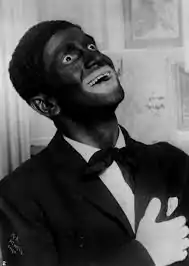Darlie
Darlie (originally known as Darkie) is an oral care brand owned and manufactured by the Hawley & Hazel Company[1] with focus on Chinese and Southeast Asian markets. The company is headquartered in Hong Kong with manufacturing facilities in Zhongshan. The brand was launched in Shanghai in the 1930s and was included in the Colgate-Palmolive portfolio in 1985 after Colgate-Palmolive acquired 50% equity in Hawley & Hazel.[2]
 | |
| Product type | Oral hygiene |
|---|---|
| Owner | Hawley & Hazel |
| Produced by | Hawley & Hazel |
| Country | China (1933–1949) Taiwan (1949–) Hong Kong (1973–) |
| Introduced | 7 December 1933 |
| Markets | Asia |
| Website | www |
Naming
Hawley & Hazel marketed Darkie toothpaste as a parody of American minstrel performer, Al Jolson, who became popular for his blackface performances. The whiteness of his teeth inspired the brand name and logo. Darky, or darkie, is an ethnic slur used primarily in the Western World to refer to black people. The packaging featured an image of a wide-eyed white man in blackface, wearing a top hat, monocle and bow-tie, an image associated with minstrel shows.

In 1985, after Colgate-Palmolive acquired 50% of Hawley & Hazel, great controversy erupted over the brand in the United States, to which Colgate-Palmolive CEO Ruben Mark responded by issuing an apology, changing the English name of the toothpaste to "Darlie" in 1989, and altering the image on the packaging to show a racially ambiguous face in a top hat to avoid racial misunderstanding.[3] However, the Chinese name of the brand, "黑人牙膏" (in English, "Black Person Toothpaste"), remains the same and a Chinese-language advertising campaign reassured customers that "Black Person Toothpaste is still Black Person Toothpaste".[4]
After the entry of Colgate-Palmolive, the brand continued to be sold in several Asian countries, including Taiwan, China, Indonesia, Malaysia, Singapore, Vietnam and Thailand, where its brand and logo were not considered offensive. Colgate-Palmolive announced the brand would not be sold outside of Asia.[5]

The brand experienced an increase in popularity and notoriety in 2004, after the toothpaste, along with other allegedly racist brands, was featured in the mockumentary C.S.A.: The Confederate States of America. It was depicted as a fictional brand that is popular in the alternative history of the film; the final credits reveal that it, along with most of the other brands, is a genuine product.[6]
On June 19, 2020, following the murder of George Floyd and subsequent protests, Colgate-Palmolive announced it will work with Hawley & Hazel to "review and further evolve all aspects" of the Darlie brand, including the brand name.[7] At the time of the announcement, the Chinese name of Darlie was still "黑人牙膏" (in English, "Black Person Toothpaste"). The announcement followed similar announcements made by PepsiCo/Quaker Oats (Aunt Jemima) and Mars, Incorporated (Uncle Ben's) for their respective brands. In November 2020, the blackface imagery of the brand remained unchanged.[8] On December 14, 2021, Hawley & Hazel announced the Chinese name of the brand will be changed from "黑人牙膏" ("Black Person Toothpaste") to "好來" ("Haolai") starting in March 2022, aligning it with the company name.[9][10][11][12]
Product and market share
The original flavor of Darlie was mint. Other flavors are available for children.[13]
As of 1989, the toothpaste held a 75% market share in Taiwan, 50% in Singapore, 30% in Malaysia and Hong Kong and 20% in Thailand.[14] Nowadays it is one of the bestselling toothpaste brands in China, Taiwan, Hong Kong, Malaysia, Singapore and Thailand, with market shares ranging from 10 to 30 percent.[15]
See also
- Chocolate-coated marshmallow treats, which in many languages are named with words akin to "darky"
- Commercial products using the word "nigger"
References
- "HKGCC - Hong Kong Business Directory". www.chamber.org.hk. Retrieved 2021-08-26.
- "Investegate |Colgate-Palmolive Co Announcements | Colgate-Palmolive Co: Colgate Announces Acquisition of GABA Holding AG". www.investegate.co.uk. Retrieved 2021-08-26.
- "Darkie drops offensive name and logo". Straits Times. 1989-01-29. p. 6. Archived from the original (JPEG) on 2015-12-04.
- hkcfphobia (2007-08-01). "【HKTVC】Darlie 黑人牙膏 1990/20sec". YouTube. Archived from the original on 2021-12-21. Retrieved 2013-10-29.
- "'Darkie' toothpaste puts company in a squeeze". Baltimore Afro-American. 1986-03-01. Retrieved 2015-12-04 – via Google.
- McCarthy, Todd (2004-03-09). "Review: 'C.S.A.: The Confederate States of America'". Variety. Retrieved 2013-10-29.
- Shakib, Delara (June 19, 2020). "Colgate-Palmolive to review product's name that translates to 'Black people toothpaste'". NBC News. Retrieved June 20, 2020.
- Grundy, Tom (November 27, 2020). "Darlie toothpaste remains on shelves five months after Colgate vowed to rethink 'racist' brand". Hong Kong Free Press. Retrieved November 27, 2020.
- Hazel, Hawley & (14 December 2021). "Hawley & Hazel Introduces New Brand Initiative to Uplift Brand Value and Capture New Growth Opportunities in the Oral Care Category". www.prnewswire.com. Retrieved 14 December 2021.
- "88年歷史「黑人牙膏」將消失!母公司宣布明年3月更名 | 聯合新聞網:最懂你的新聞網站". 聯合新聞網 (in Chinese). 2021-12-14. Retrieved 14 December 2021.
- "【黑人牙膏】 黑人牙膏不再? 品牌改用「 DARLIE 好來」 紳士頭像不變 - 香港經濟日報 - 即時新聞頻道 - 商業". inews.hket.com. Retrieved 14 December 2021.
- Yuen, Simon (December 14, 2021). "Darlie updates Chinese name and logo while retaining English brand". Marketing Interactive. Retrieved September 8, 2022.
- http🖉"Darlie Hong Kong | Toothpastes, Toothbrushes & Oral Care Tips". Darlie Hong Kong Official Page.
- Whiting, Kenneth L. (1989-04-17). "Darkie Toothpaste Changes Name". Singapore. Associated Press. Archived from the original on 2013-10-30. Retrieved 2013-10-29.
- Christopher DeWolf (2018-12-10). "How Darkie, now Darlie, became East Asia's favourite toothpaste despite its blackface branding". South China Morning Post.